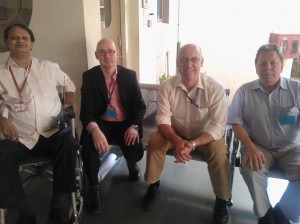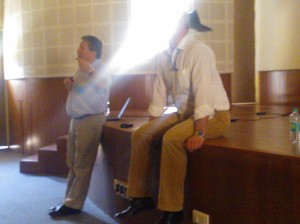see at…………..http://news.scientificupdate.co.uk/index.php?action=social&chash=1c1d4df596d01da60385f0bb17a4a9e0.1201
2 – 3 March 2015
Sheraton Fisherman’s Wharf Hotel - San Francisco
Sheraton Fisherman’s Wharf Hotel - San Francisco
The aim of this professional development course is to provide a good basis to work from when involved in taking development candidates to the first in human trials and with a view on some longer-term requirements. The course content will focus on the necessary early phases of chemical development, as would typically be required to support production of up to about 2kg.
The course will introduce and discuss the following:
- Requirements in order to move from small (less than 1g) supplies to the first 100g or so for preclinical work
- Further scaling to 1-2kg non-cGMP
- Requirements to make material for use in clinical trial – an introduction to cGMP coupled with the scaling issues
- An overview of the requirements to move processes to fixed vessels, assuming cGMP is required – what operations can readily be transferred and those that should ideally be developed out
- The phases of development and indicative timelines with quality requirements
- The importance of physical form selection, understanding and control
- Impurities and their control, with specific discussion on genotoxic impurities and developing the specification for the API as it moves from preclinical batch preparation to cGMP batches for clinical trials
Your Course Tutor
Dr John Knight
|
|

WEBSITE
http://www.scientificupdate.co.uk/

John Knight gained a first class honours degree in chemistry at the University of Southampton, UK. John remained at Southampton to study for his PhD in synthetic methodology utilizing radical cyclisation anddipolar cyloaddition chemistry.
After gaining his PhD, John moved to Columbia University, New York, USA where he worked as a NATO Postdoctoral Fellow with Professor Gilbert Stork. John returned to the UK in 1987 joining Glaxo Group Research (now GSK) as a medicinal chemist, where he remained for 4 years before moving to the process research and development department at Glaxo, where he remained for afurther 3½ years.
During his time at Glaxo, John worked on a number of projects and gained considerable plant experience (pilot and manufacturing). In 1994 John moved to Oxford Asymmetry (later changing its name to Evotec and most recently to Aptuit) when it had just 25 staff. John’s major role when first at Oxford Asymmetry was to work with a consultant project manager to design, build and commission asmall pilot plant, whilst in parallel developing the chemistry PRD effort at Oxford Asymmetry. The plant was fully operational within 18 months, operating to a 24h/7d shift pattern. John continued to run the pilot plant for a further 3 years, during which time he had considerable input to the design of a second plant, which was completed and commissioned in 2000.
After an 18-month period at a small pharmaceutical company, John returned to Oxford in 2000 (by now called Evotec) to head the PRD department. John remained in this position for 6.5 years, during which time he assisted in its expansion, established a team to perform polymorph and salt screening studies and established and maintained high standards of development expertise across the department. John has managed the chemical development and transfer of numerous NCE’s into the plant for clients and been involved in process validations.
He joined Scientific Update in January 2008 as Scientific Director. Contact John Knight.

I am seated left with DR PAUL MURRAY, DR JOHN KNIGHT, DR WILL WATSON, At Scientific Update Organic Process Research and Dev Conference, NCL, PUNE ,INDIA, 5 TH DEC 2014
DR WILL AND DR JOHN IN A DISCUSSION

